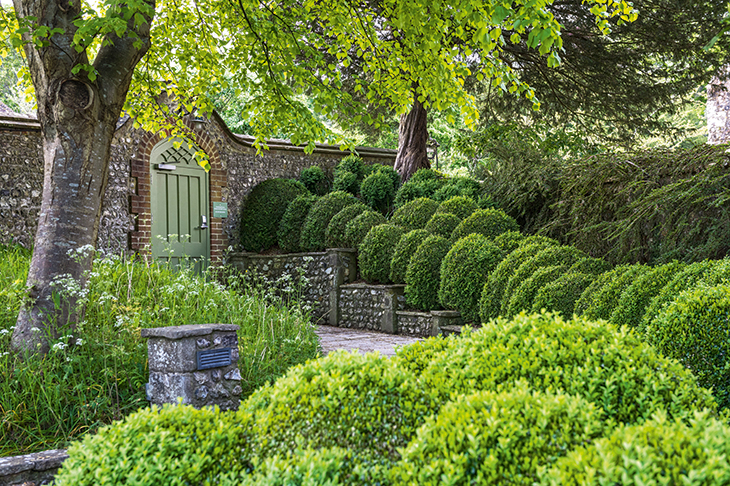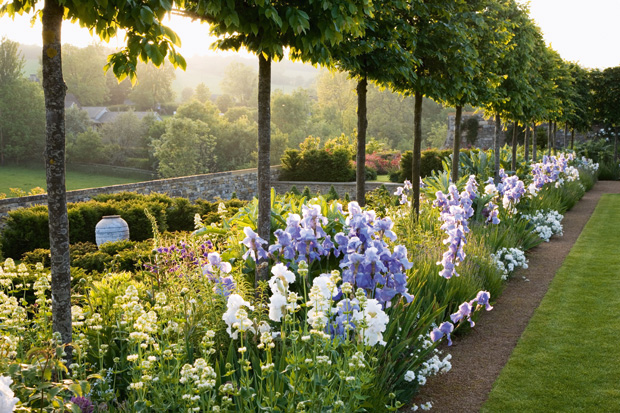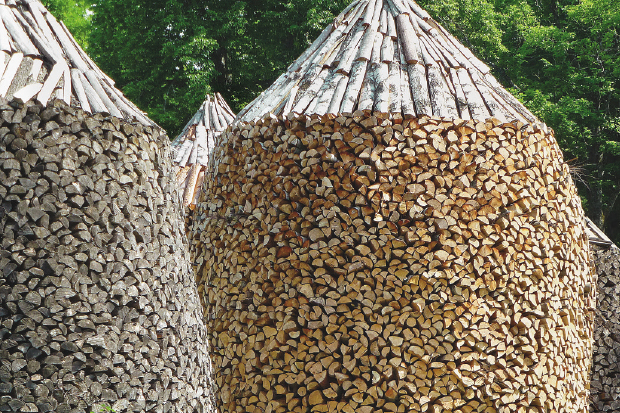There are probably no more gifted professional gardeners in England than Jim Buckland and Sarah Wain, husband and wife and joint head gardeners at West Dean in Sussex. On the verge of their retirement, after 27 years of effecting a renaissance in the gardens and grounds of this country house arts centre (bequeathed by Edward James), the couple have described their work and achievements in At West Dean: The Creation of an Exemplary Garden (White Lion, £40).
The lucid, educated text, written by Jim and overseen by Sarah, is, mercifully, no empty exercise in heart-tugging nostalgia but an unsentimental account of hard-won practical experience in a multi-faceted, forward-looking horticultural enterprise, where precise care, elevated standards, close teamwork, attention to aesthetics and grindingly hard work have combined to make West Dean a potent lure to paying visitors. The demonstration of long-established, exquisite skills — particularly in glasshouse and orchard — practically brings tears to the eyes of a trained gardener like me. (How I should love to have worked at West Dean.) Moreover, this book presents a touching, because thoroughly understated, picture of a very close and enduring partnership. The photographs by Andrea Jones, set throughout the book, are of unsurpassable quality and aptness; on the strength of them alone, £40 is cheap at the price.
The work of the West Dean gardeners is intensely precious because it is in an almost extinct tradition. Garden designers since the war have necessarily turned away from that tradition, attempting instead to lay out imaginative gardens appropriate to their shrunken size and the shortage of good professional gardeners. No one in this country has been more influential in developing a more practical aesthetic than John Brookes, who died in March, just as A Landscape Legacy — part memoir, part work retrospective — was published by Pimpernel Press (£40).
This tour d’horizon of his projects across the world and across the decades since 1960, points to the ways in which design has evolved, and amply demonstrates why Brookes was for so many years an enormous influence on both private and public garden making. We are fortunate that he lived to complete this book, for he was an inspired teacher and mentor as well as a designer, and every page, with its plans, elevations and photographs, underscores not only his expertise but his powers in communicating it.
An even more accomplished communicator is Fiona Stafford, whose The Brief Life of Flowers (John Murray, £20) is a description of the botany, lore and literature of some common flowers, shot through with her own memories. Each chapter features a particular native or garden plant — elderflower, roses, pinks, foxgloves, bluebells, for example — so there is unity of a kind. (Several of these chapters were originally aired on Radio 3’s The Essay.) Botanical miscellanies are not thin on the ground but few, if any, offer prose as cultured, scrupulous and engaging. Anyone who can connect a portrait of the members of the Somerset House Conference in 1604 with bluebells, or who knows of an early draft of Milton’s poem ‘Lycidas’, deserves respect.
As Professor Stafford reminds us, Charles Darwin wrote that nothing gave him more satisfaction in his scientific life than making out the meaning of the structure of primroses. We all know he studied earthworms, Galapagos finches and barnacles but, as Ken Thompson makes clear in Darwin’s Most Wonderful Plants: Darwin’s Botany Today (Profile Books, £10.99), he spent just as much time investigating how climbing plants twine, orchids and primroses are pollinated, and insects are trapped by sundews, when formulating his theories of evolution. Dr Thompson — plant biologist, Daily Telegraph columnist and writer of popular science that even I can understand — both demystifies Darwin’s botanical research and describes modern scientific discoveries that expand or confirm his conclusions. This is Darwin for a dummy, with a sense of humour and an enquiring mind.
You won’t need an enquiring mind for The Generous Gardener: Private Paradises Shared (Pimpernel Press, £30), a compilation of Sunday Times articles by Caroline Donald, since the book consists of shortish interviews with famous or rich people (as well as a few well-known garden designers), some of whom live abroad and a number of whom are dead.
It is pleasant to think of busy, important people finding consolation and respite in their gardens and, in truth, the rest of us have an unconquerable weakness for gawping at our betters. However, in my experience, celebrities don’t necessarily have much to offer the gardening reader, since they often pay other people to do the sweaty stuff and even sometimes the vision thing as well. These articles have appeared over the past 15 years, so Donald has helpfully provided short updates and, in the hallowed tradition of celebrity interviews, they accentuate the positive: the one concerning the wife of a ‘successful property financier’ with a garden in Kent, reads:
Her husband has since departed for pastures new, but, on the plus side, it gives her more time both for gardening and for her new interest: stitching.
That apart, there are things to enjoy in this book, in particular the unpretentious keenness of Jim Carter and Imelda Staunton, the Lancastrian self-restraint of Sir Harrison Birtwistle, and the old-school charm of the late Lord Carrington. I am glad I now know that the late Sir Henry Cecil, the racehorse trainer, planted rugosa roses round the fillies’ yard, because they liked eating the hips. I’ve got the rugosas all right — I’m just a bit short of racehorses.
Got something to add? Join the discussion and comment below.
Get 10 issues for just $10
Subscribe to The Spectator Australia today for the next 10 magazine issues, plus full online access, for just $10.
You might disagree with half of it, but you’ll enjoy reading all of it. Try your first month for free, then just $2 a week for the remainder of your first year.














Comments
Don't miss out
Join the conversation with other Spectator Australia readers. Subscribe to leave a comment.
SUBSCRIBEAlready a subscriber? Log in